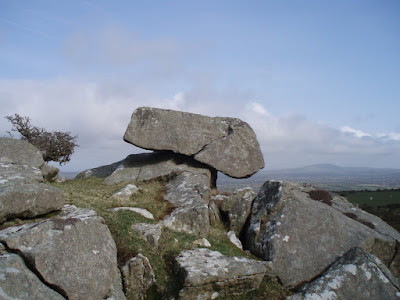And remember that many of these features have signs of human habitation close by -- and as far as I know nobody -- except those of the Von Daniken school of science -- is inclined to say that they were created by our superhuman ancestors or by aliens from outer space......
How much do we know about Stonehenge? Less than we think. And what has Stonehenge got to do with the Ice Age? More than we might think. This blog is mostly devoted to the problems of where the Stonehenge bluestones came from, and how they got from their source areas to the monument. Now and then I will muse on related Stonehenge topics which have an Ice Age dimension...
THE BOOK
Some of the ideas discussed in this blog are published in my new book called "The Stonehenge Bluestones" -- available by post and through good bookshops everywhere. Bad bookshops might not have it....
To order, click HERE
Some of the ideas discussed in this blog are published in my new book called "The Stonehenge Bluestones" -- available by post and through good bookshops everywhere. Bad bookshops might not have it....
To order, click HERE
Wednesday, 23 December 2015
Anomalies, Aberrations and Anachronisms
It seems to me that the main grounds for assuming that the "big rhyolite block" at Rhosyfelin is a "proto-orthostat" put into position by heroic quarrymen are that it is an anomaly, or an aberration or an anachronism. Its position is supposed to be peculiar, as is its size, its shape and its flat upper surface..... and the assumption is that because the archaeologists are amazed by it, it cannot possibly be a perfectly normal block of rock in a perfectly natural position. Hmmm.....
Let's celebrate Christmas by looking at a few of nature's aberrations. We wonder at them because they are unusual or even peculiar, and such features appear all the time in photo galleries on the web that are devoted to "amazing natural wonders" and so forth. But actually they look as they do because of the operation of the laws of physics, and every time, when geomorphologists and geologists do a little work on them, they become rather less miraculous and a little more mundane. Boring, I know...... but they are still spectacular and exciting to geomorphologists, and it was features such as these that encouraged me into an academic career all those years ago. Enjoy!
And remember that many of these features have signs of human habitation close by -- and as far as I know nobody -- except those of the Von Daniken school of science -- is inclined to say that they were created by our superhuman ancestors or by aliens from outer space......
And remember that many of these features have signs of human habitation close by -- and as far as I know nobody -- except those of the Von Daniken school of science -- is inclined to say that they were created by our superhuman ancestors or by aliens from outer space......
Subscribe to:
Post Comments (Atom)













5 comments:
C’est magnifique, mais ce n’est pas la guerre: c’est de la folie.
No glaciers were involved in the building of the Taj Mahal, the Hanging Gardens of Babylon, the Pharos at Alexandria, 'Agia Sophia, Mornington Crescent or the ovens at Belsen.
M
Personally believe that CRF would have looked very special to the first visitors after the ice receded, the chalky white crags with the bright blue interior when broken. The headwaters of the Nyfer a breeding ground for salmon and sea trout, the soil a little bit more fertile than elsewhere due to the volcanic minerals, fresh spring fed water tumbling by. A veritable little paradise.
Even in modern times, when I first saw the crags from upstream the valley I was touched by the beauty of the place. There are far finer sights in Greenland to be sure, but Rhosyfelin is a bit special surely.
Quite so, Chris. It is indeed a very pretty spot, and probably was in prehistoric times too..... a perfect place for a barbie, when out for the day with the wife and kids.
Legend has it that King Arthur and his knights liked to roast a wild bore in the valley. Every time they would compete to pull the picnic table straight, the winner being awarded the prime cut, until the last time when the table cracked and Merlin said that this was a bad omen.
This is one of the tales that did not make it into the Mabinogion.... and a happy Christmas to all.
Chris. Were they drillers by any chance looking for oil or water via a borehole!
'Roast a wild bore' is this roughneck slang, like finding a gusher.
King Arthur and his Knights of the Perched Water Table. Quaffing sacred spring water and then questing for tired stones on the Druidical Plains. Don't worry Brian will write it, perhaps weaving it into Martha's story.
Website Culture24 (24 notable archy things 2015,, oh joy, my spell checker wanted archy thugs)has a set of more reasoned quotations. The only wild boar there is Richard III-associated.
Bloody visitors all week -families and donkeys- refugees I think and then marauding maudlin Magi (Pace T. S.E)
M
Post a Comment